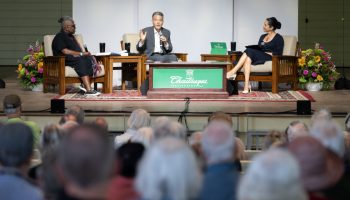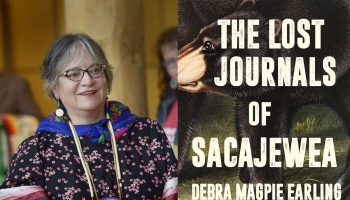Susie Anderson
Staff writer

For George Saunders, storytelling does more than entertain — it cuts through the noise.
“A laugh is a cutting through of all the ideas and concepts that we think separate us,” Saunders said. “In the most simple way, it says, ‘We find the same thing funny.’ So for me, it’s not just true of humor. It’s true of pathos. It’s true even if I just described the sunlight on the side of a barn and you go, ‘Oh, yeah.’ Then we’ve cut through it.”
In a presentation for the Chautauqua Literary and Scientific Circle and the Chautauqua Lecture Series, in a week on “Art in Action: Building Community Through the Arts,” Saunders will discuss the power of the literary arts to bridge divides at 10:45 a.m. today in the Amphitheater. A collection of nine stories written between 2012 and 2022, Liberation Day reflects an idea that Saunders said he didn’t consciously plan: the deep human desire to be free from the underlying discontent of being oneself.
“To have a self is your doom. But who are you without it?” Saunders said.
In the eponymous opening story, programmed individuals attached to a wall perform for their oppressors. In another, a grandfather writes a heartfelt missive to his grandson and grapples with his own complicity in a world under authoritarianism. In another, office gossip and stolen paper towels spiral into an exploration of workplace hierarchies.
The collection explores the paradox of self — causing both suffering and meaning — and invites readers to investigate the tension without giving easy answers.
“Like a lot of fiction, I think the idea is to open the question up without totally answering it, and let those two truths kind of stare at each other across the room,” Saunders said. “That book was sort of about liberation in that sense — can we be liberated from this prison of being ourselves? Do we want to be?”
To capture and maintain the attention of readers, Saunders said that the element of surprise is paramount for himself as he writes and revises.
“If a story in the collection doesn’t surprise me, it doesn’t go in the book,” Saunders said.
Rarely planning his stories in advance, Saunders said he treats each new story like a conversation with a friend, poking and prodding and exploring different paths to see what the story needs from him. Sometimes, he said surprises emerge from a pure effort to keep the story lively.
“It’s almost like if I’m always playing a beautiful piece of music, and then in the middle of it, somebody grabs my instrument and makes me play another one,” Saunders said. “I’m still playing the same melodies and still playing the same piece. … It’s not nearly as planned out as one might think, but by the time you get to the end of it, it should look sort of planned out or look intentional.”
In a lecture presenting an “inside out view” of the writing process, Saunders will explore a writing process hinged on authentic expression.
“To communicate with someone, your reader, you can’t just put forward part of yourself,” Saunders said.
Saunders’ witty and authentic approach to writing characterizes each story in Liberation Day — his first short story collection since The Tenth of December. Saunders’ stories frequently appear in The New Yorker, GQ and Harper’s Magazine and have appeared in the O’Henry, Best Non-Required Reading, Best American Travel Writing and Best American Short Story anthologies.
While establishing himself as a master of the short story form, Saunders’ debut novel in 2017, Lincoln in the Bardo, cemented his talent in a new genre through an experimental and sensitive exploration of Abraham Lincoln’s grief after the death of his son, Willie. The Booker Prize-winning novel is being adapted into an opera by the Metropolitan Opera, and Chautauqua will host its onstage workshop debut on Friday.
Saunders said that in the operatic adaptation of Lincoln in the Bardo, composer Missy Mazzoli and librettist Royce Vavrek channeled their talent into a new vision of his novel. Commissioned by the Met, the piece is being workshopped by Chautauqua Opera Company with a performance and subsequent talkback with Mazzoli, Vavrek and Saunders on Friday. Saunders, both impressed and excited by Mazzoli and Royce’s work, said the opera inspired by his work stirred new ideas for him.
“It’s almost like if you had a gem, and then somebody turned it and different light came through it, you know? And I’m like, ‘Oh yes, I recognize that light,’ ” he said. “It made me want to kind of catch that light and put it into the next work.”
Capturing such light in a story as a writer is one thing. Expressing it to readers in a way that is clear and resonant is another. That is what Saunders strives for in storytelling. He described the “mutual reassurance” between author and reader as one that transcends time and space.
“Even if it’s sometimes the most difficult passage in Shakespeare, where you’re like, ‘What the hell are you talking about?’ But at some point, when you get it, you go, ‘Oh, yes, I know just what you mean, William.’ And that’s really powerful,” he said. “That’s him reaching across the ages to say, ‘I’m not that different from you.’ ”




